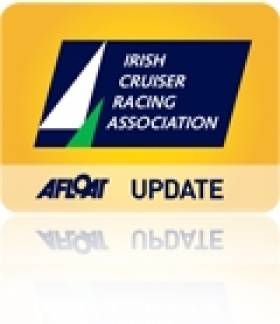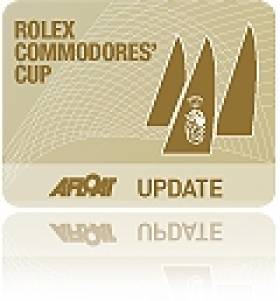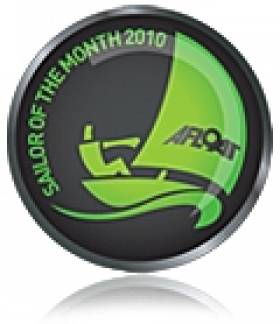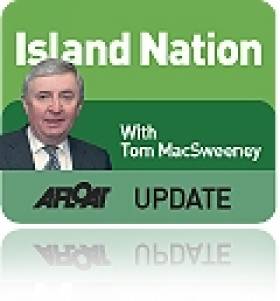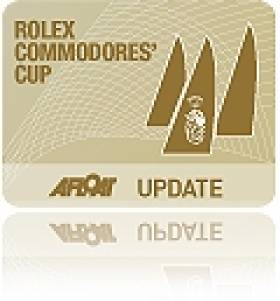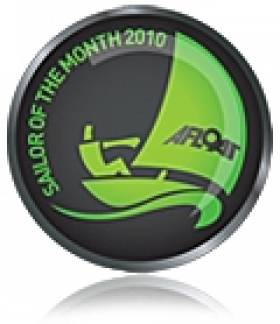Displaying items by tag: Dave Dwyer
Outstanding Anthony O'Leary is Worthy Sailor of the Year
Anthony O'Leary of Cork is the Afloat.ie/Irish Independent "Sailor of the Year" in celebration of his outstanding achievements afloat nationally and internationally throughout last season, and to honour his dedication to sailing in all its forms both as a participant and an administrator.
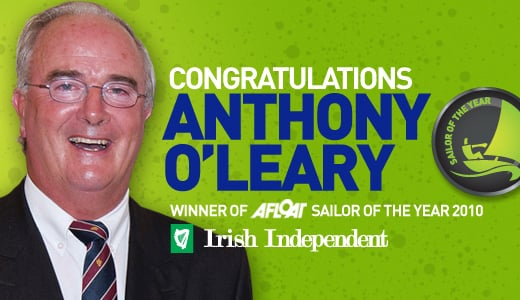
The O'Leary pace afloat and ashore belies his age of 53. During 2010, it was in May that he was "Sailor of the Month" for an already remarkable list of wins with his Ker 39 Antix. Having topped the April Series in Kinsale, he then won the Crosshaven-Dun Laoghaire race overall, went on to win his class and be one of the top points scorers in the ICRA Nationals in Dublin Bay, and then went on to Scotland to win his class overall with a nail biting brace of wins on the final day of the Scottish Series.
To achieve all that before May was out was exceptional, but the O'Leary progress was only beginning. The big picture was to maintain momentum towards the international Commodore's Cup in the Solent in August. Antix was one of the three boat squad, and her skipper was also the team captain in a campaign which was light years away from the glossy efforts which dominated the boom years of Irish affluence.
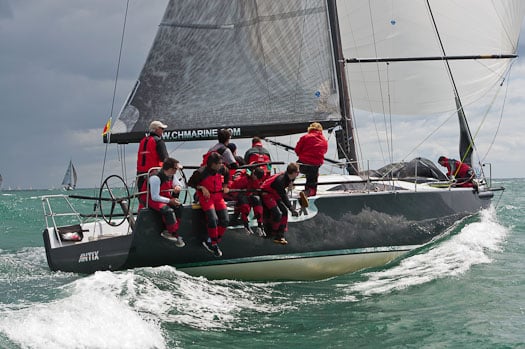
Anthony O'Leary takes on the waves at the helm of his yacht Antix during Cork week in Cork Harbour. Photo: Bob Bateman
In previous seasons, Ireland had been able to muster enough boats for two or even three teams, yet had never won despite being within inches of success. But this time round, only three boats were game for it, and only one – Rob Davis's Corby 36 Roxy – was new. Yet with Dave Dwyer's ever-keen Mills 39 marinerscove.ie filling the third slot, O'Leary headed a potent force, and he himself sailed with style and inspiring sportsmanship to give Ireland a commanding overall win.
Anthony O'Leary is the personification of Irish sailing at its very best. With the enthusiastic support of his wife Sally, he is father to a family which has logged outstanding sailing success at all levels. Yet he himself is in many ways the quintessential club sailor. He is as happy racing the Autumn series at Crosshaven with a 1720 or the West Cork regattas with a cruiser-racer, as he is competing at the highest levels. He has been among the front runners for the title of Ireland's "Sailor of the Year" several times. And now, as with all his wins, when he does do it, O'Leary does it with style.
Marinerscove Takes Narrow Lead in 'Boat of the Year' Opinion Poll
Marinerscove leads Afloat's sailing Boat of the Year opinion poll that has attracted over 1700 votes to date. After 20 days of voting the lead has changed several times in the fun poll and early leader Erisslanan, who shared boat of the week with Mariners at Cork week is now in third place on 227 votes, some distance behind ISORA winner Raging bull on 607 votes. 81 votes clear ahead is the Crosshaven boat that also bagged the British IRC title this year. Dave Dwyer's Marinerscove was of course also the middle boat in the victorious Irish Commodores Cup team in August. The ICRA boat of the year award will be awarded on November 13th at the Cruiser Racer conference in Carrigaline. You can vote by using the poll on the left hand side of Afloat's home page.
Commodores' Cup Celebration Dinner to be Held at Royal Cork
Team Ireland boats, Antix - Anthony O Leary, Marinerscove.ie - Dave Dwyer and Roxy 6 - Rob Davies and Andrew Creighton, will be represented on the night.
The dinner cost will be €30 and booking will be on first come/first served basis. Book with [email protected] or call 021 4831023.
The Commodore's Cup Team - Sailors of the Month for August
The 2010 Irish Commodore's Cup team are jointly the Afloat.ie/Irish Independent "Sailors of the Month" for August. In times past, we've had two or even three "Sailors of the Month" at once. And we even had a family – the Dicksons of Lough Ree – getting the honours together. But it's the first time that an entire team have been given the accolade.
However, the 2010 Irish Commodore's Cup team achieved their totally convincing win with a display of team spirit which was of truly international standard, and the judges acclaim the entire squad – and their enthusiastic and able management – with the accolade.
It was realized that selecting any individual sailor or one of the crews from the three boats was going to be difficult. Even when you tried to congratulate any of them, they would tend to heap praise on another of the boats. And on the rare occasion when things went wrong – as when Antix was caught by a rule break at the start of the final and clinching race – the skippers readily accepted blame.
In that instance, Antix boss and team captain Anthony O'Leary declared afterwards that he'd been "110% in the wrong". Admittedly it's not so painful saying that when you go on to sail an absolute blinder of a heavy weather race to finish second in class despite the setback of taking your penalty turn. But even so O'Leary, Dave Dwyer on marinerscove.ie, and the new boys on Roxy 6 were exemplary in their achievement.
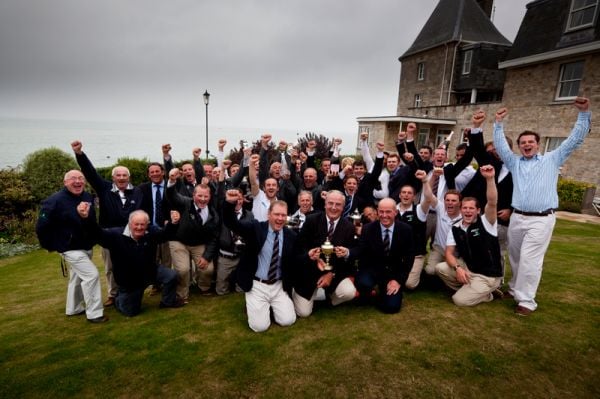
Ireland's Commodores Cup Team is August's Sailors of the Month. Photo: David Branigan
Roxy 6 was given special praise as she was still very raw, a new Corby 36 built for Rob Davis in Pembroke in Wales, and put together on the water at some speed by a Cork crew headed by Andrew Creighton, with Maurice "The Prof" O'Connell invaluable as the single permitted onboard professional.
And they sailed with the steady consistency and that sense of the bigger picture which is the key to team success. Ashore, Barry Rose of the Irish Cruiser Racing Association was always available as manager, and the result was the kind of result the Irish sailing community have dreamed about for decades. Not only have we been within a whisker of winning the Commodore's Cup in recent years, but way back in the great days of the Admirals Cup in 1979, the Irish team went into the final event of the series, the Fastnet Race, with what seemed a commanding points lead.
The notorious Fastnet storm of 1979 put paid to that. It was ironic that it was extreme Irish weather which blasted our chances. But the pain of that, and other blighted hopes, were so gloriously blown away in the Solent on Saturday August 22st as the final race was completed with Ireland's winning points piled high.
Ireland's Commodore's Cup team Crew List HERE.
Commdore's Cup Coverage HERE
Success at Last!
The world trophy for offshore cruiser racing is in Irish hands and Cork has dominated the successful assault on the Commodore's Cup in the hallowed waters of Cowes, centre of British yachting writes Tom MacSweeney.
Several times in previous years the Irish team were favourites, leading the event, with the cup seemingly in their grasp, but were beaten on the last day of the event. This year they led from the opening day. Maintaining their lead to the finish after five days of racing.
Putting just one team of three boats into the competition this year proved the best approach. Like other competing nations such as the UK and France, Ireland had entered previously entered several teams. But the result was internal rivalry that did not bring overall Irish victory.
On Saturday last as the Commodore's Cup fleet of 30 boats, representing 10 nations, headed into the Solent off Cowes for the final day's racing, Ireland was again in the lead. The crews of the Irish team's three boats - Antix, Marinerscove.ie and Roxy 6, were conscious of what had happened to their predecessors and how victory had been snatched away on the last day.
Throughout the week they had built a commanding lead, each of the team boats achieving top fleet positions racing in three different classes. It seemed they were almost certain to win the cup, but those thoughts were being forced aside, almost as if concentrating on them might jinx the final outcome.
With the team boats all from the Royal Cork, one competing in each class, the sailors all knowing each other, there was to be no repeat of previous years. Then there had been internal skirmishing between the several Irish teams on the final day, jockeying for positions, but seemingly focus to bring overall victory.

Ireland celebrates victory in Cowes last weekend. Photo: David Branigan
There was plenty of skirmishing and jockeying with opponents on the start line for the final race last Saturday when one French boat tried to protest Antix out of Class 1 in an incident before the start. Anthony O'Leary, skippering Antix, kept his cool and took a penalty time turn allowed under the rules, avoiding what could have been a messy protest. The crew of Antix sailed her so well that she made up lost time at the start during the race. When the French protested at the end of the race, they lost out, having overlooked that Antix had taken the penalty before the race started
Sweet justice for an Irish team when one remembers what happened in another world cup sport!
Strong, gusty winds, dominated the final day, but all three Irish boats sailed well. Antix finished second in Class 1, while Dave Dwyer's Marinerscover.ie revelled in the conditions with another first place in Class 2 while Rob Davies' Roxy 6 was second in Class 3, keeping the Irish team out in front, aggregated on the overall results.
At the rather upper class Royal Yacht Squadron in Cowes, it was a great sight when the 50-strong Irish contingent of crews, team management and shore support staff were invited on stage at the presentation ceremony. Their haul of prizes included being the best European team at the event, the best team in both offshore and inshore races during the week and of course, the Commodore's Cup, a long-awaited victory.
After the formalities, Cowes echoed to the sound of the Irish singing The Fields of Athenry in the Pier View pub which had been unofficial headquarters for the team during the week.
The team was organised by the Irish Cruiser Racing Association under the auspices of the Irish Sailing Association. Management was led by Commodore Barry Rose from the RCYC, with Denis Kiely from Kinsale Yacht Club; Mike Broughton, Norbert Reilly and Fintan Cairns, former ICRA Commodore. He had led previous attempts to win the cup.
This is a great achievement, adding to the standing of Irish sailing internationally. All those involved, the boat owners, skippers, crew, team management and shore support deserve the highest praise. That Cork has had such a dominant involvement in Ireland's victory is marvellous.
In youth sailing, Cork sailors are continuing to stamp their mark nationally. I have been highlighting the achievements of young Optimist sailors, which were added to at the national class championships, sailed at Waterford Harbour Sailing Club. This is based in Dunmore East where huge swells are typical conditions as the seas roll into that fishing port.
Peter McCann from the Royal Cork sailed magnificently to become Senior Open and National Champion. Second to him was Peter Crosbie, also from the RCYC. Daire Cournane, a member of both the RCYC and Kinsale YC dominated the junior fleet, winning the open and national championship titles.
Another young sailor has caused so much controversy that the World Sailing Speed Record Council has decided it will no longer give recognition to records for "youngest" sailors, "to avoid encouraging dangerous sailing attempts." Guinness World Records has made a similar decision. Both were announced as 14-year-old Dutch girl Laura Dekker began a bid to become the youngest person to sail alone around the world. She had planned to leave from Portugal, but Portugese law does not allow minors to sail alone. So she left from Gibraltar instead.
A Dutch Court previously blocked her attempt at the request of child protection agencies, though her parents, experienced sailors, have supported her. Born on a yacht, she maintains she is competent to make the voyage which will not be non-stop. Dekker will call at several ports.
Earlier this year Australian Jessica Watson completed a non-stop 210-day round-the-world voyage at the age of 16. In June another 16-year-old, Abby Sunderland, was rescued in the Indian Ocean when she and her boat got into difficulties.
If Laura Dekker does complete her voyage, it will not get official record recognition.
• This article is reprinted by permission of the CORK EVENING ECHO in which Tom MacSweeney writes maritime columns twice weekly. Evening Echo website: www.eecho.ie
Commodores' Cup Arrives in Ireland
The Rolex Commodores' Cup arrived back in Cork last night and winning team Ireland received a heroes welcome from the Royal Cork Yacht Club writes Claire Bateman.
In his welcome Admiral Paddy McGlade mentioned there were ten trophies for the event, eight of which were won by Team Ireland. One was for best British boat that obviously Ireland couldn't win, and the other was for best female crew category which they certainly couldn't win! When Team Leader Anthony O'Leary arrived he received a standing ovation and was joined by Andrew Creighton and his family.
Unfortunately marinerscove.ie skipper David Dwyer was still on his way home and could not be present but nonetheless marinerscove.ie was very much in the minds of all present.
In the Team Leader's speech Anthony made special mention of and paid tribute to Rob Davies of Roxy 6 and the hugely important part Roxy had played in the successful outcome.
He said Antix and marinerscove.ie had been around for some time but Roxy was a new build recently launched. He again expressed his gratitude for the unstinting and unswerving support so generously provided by Rob Davies any time it was requested for Roxy's campaign.
ICRA Commodore Barry Rose also spoke and gave a graphic description of the final race of the series and how well the Irish team coped with the conditions when all around them other boats were having major difficulties.
The formalities over, the Admiral rang the bell and the team members and their supporters enjoyed refreshments as they relived the seven days of the Rolex Commodores' Cup.
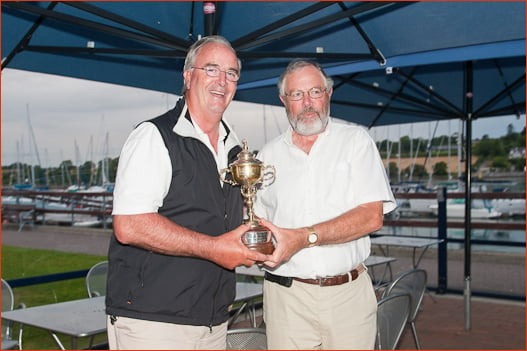
Job well done. Team Ireland Captain Anthony O'Leary is welcomed home by Royal Cork Admiral Paddy McGlade. Photo: Bob Bateman
Dave Dwyer is 'Sailor of the Month' for June
Dave Dwyer of Cork is the Afloat.ie/Irish Independent “Sailor of the Month” for June with his convincing retention of the British Open IRC Championship over three days of racing which concluded in the Solent on Sunday June 27th.
A busy month of sailing had already produced several worthy contenders for the Sailor title. But Dwyer’s performance on the final weekend with the 39ft Marinerscove.ie (designed in 2006 by current Sailor of the Year Mark Mills of Wicklow) was in a league of its own.
The boat has of course been regularly updated and optimized during four busy years at the sharp end of national and international fleets. But even in these recessionary times, there are completely new and decidedly hot contenders coming on the scene,
Thus even as the Dwyer team – and it’s a formidable equipage - was shaping up for the Solent championship, right on Mills’ own doorstep in Wicklow it was being confirmed that the overall winner of the Round Ireland Race 2010 was the 46ft Tonnere de Breskens, designed by Jason Ker in 2008.
To add to the pain, second place went to another 2008 Ker boat, the 39ft Inis Mor (Bernard Gouy, Clifden Boat Club). In fact, there wasn’t a Mills design in the entire round Ireland fleet. But within four days, marinerscove.ie had done the business and redressed the balance against an international lineup off Cowes, clinching it with four wins on the final day of racing, and catapulting Dave Dwyer into Irish sailing’s kingpin spot for June.
More from W M Nixon on Dwyer's performance in today's Irish Independent here.
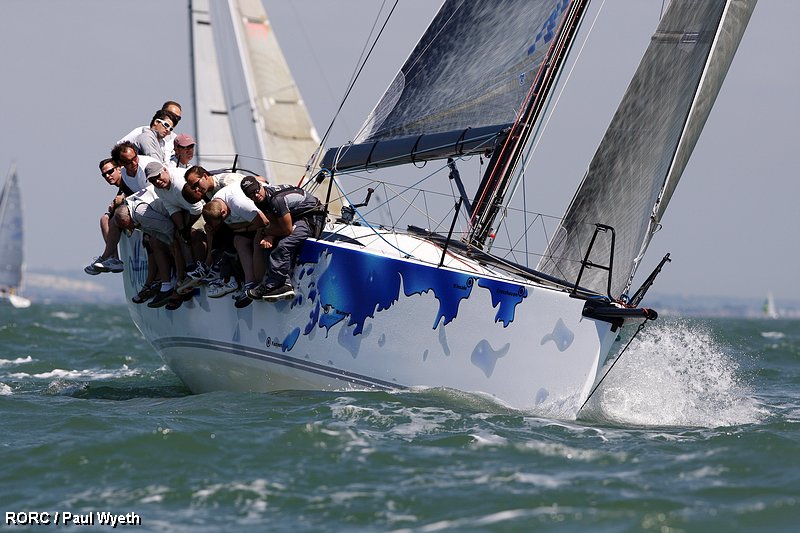
Dave Dwyer's Marinerscove in winning form on the Solent. Photo: Paul Wyeth



























